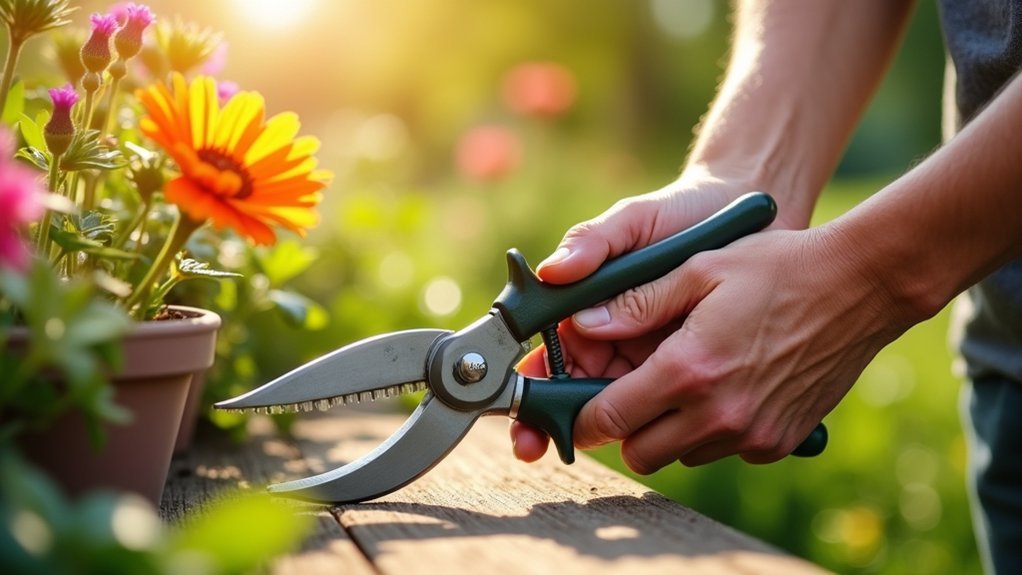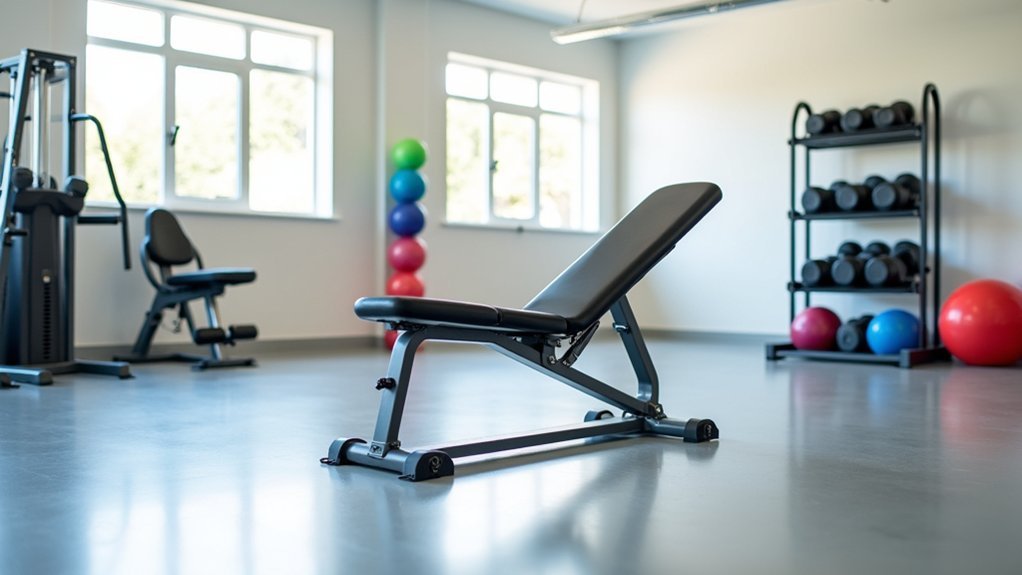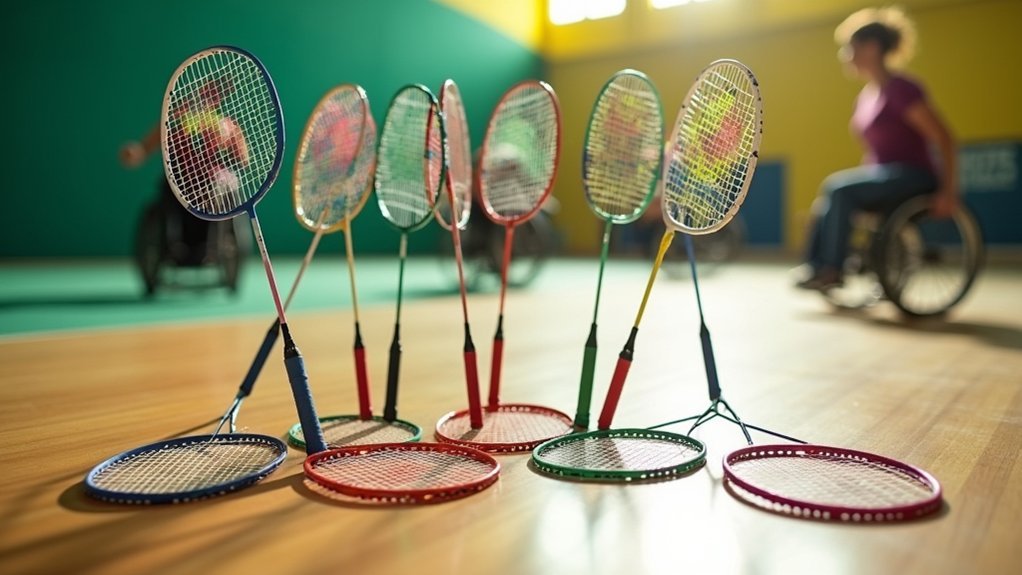Three innovative garden tools are revolutionizing Alzheimer’s care: ergonomic pruning shears with non-slip handles that reduce joint strain while boosting patients’ confidence; raised garden beds that eliminate bending and allow wheelchair access; and sensory plant selection kits featuring therapeutic herbs that stimulate memory and reduce anxiety. You’ll find these specialized tools not only make gardening accessible but also provide significant psychological benefits, enhancing cognitive function and creating meaningful connections with nature. The therapeutic impact extends far beyond the garden.
Ergonomic Pruning Shears: Safe Cutting Tools That Enhance Dexterity and Confidence

The right pruning shears can transform gardening from a frustrating challenge into a therapeutic activity for those with Alzheimer’s. Ergonomic designs align with the natural position of your hand, reducing joint strain and improving grip control for those with limited dexterity.
Look for shears with non-slip handles and protective guards to prevent injuries. Ratchet pruners offer additional leverage, making cutting easier while requiring less strength. These thoughtful features distribute force evenly, allowing smooth, controlled movements that boost precision and confidence.
Beyond physical benefits, successfully using these tools fosters independence and self-esteem. The lightweight construction makes maneuvering simpler, encouraging regular use that helps maintain fine motor skills and creates meaningful connections with nature—essential for psychological well-being. Regular gardening with these appropriate tools can significantly reduce stress and anxiety, improving cognitive function and mood for those with Alzheimer’s.
Raised Garden Beds: Accessible Planting Spaces That Reduce Physical Strain
Elevated several inches from the ground, raised garden beds offer ideal planting spaces for individuals with Alzheimer’s, eliminating the need to bend, kneel, or stoop.
These customizable platforms greatly reduce joint strain while providing stable surfaces that minimize fall risks.
Thoughtfully designed garden beds reduce physical strain while creating secure environments for memory care residents to thrive.
You’ll find raised beds enable wheelchair access and promote independence for your loved ones. They create opportunities for meaningful sensory engagement as plants become easier to touch, smell, and see.
This proximity to varied textures and scents can trigger positive memories and reduce anxiety.
The defined planting areas also encourage social interaction during gardening activities. These designs are particularly effective for those with mobility challenges as they offer accessibility options that conventional gardens cannot provide.
With improved soil control and reduced maintenance demands, you’ll create a safer environment where individuals with Alzheimer’s can experience the therapeutic benefits of gardening with dignity.
Sensory Plant Selection Kits: Therapeutic Plant Collections for Memory Stimulation

Carefully crafted sensory plant selection kits bring together therapeutic herbs and flowers specifically chosen to stimulate memory and cognitive function in Alzheimer’s patients.
These collections leverage the power of familiar plants like rosemary, sage, and thyme to evoke childhood memories and create recognizable environments.
You’ll find these kits deliver remarkable benefits beyond traditional treatments:
- Reduced medication needs while improving cognitive function
- Enhanced socialization as patients engage more readily with others
- Decreased anxiety and restlessness through sensory stimulation
- Increased autonomy and reduced apathy
Researchers recommend these kits as part of an integrative approach to Alzheimer’s treatment, blending traditional plant knowledge with modern scientific understanding.
Frequently Asked Questions
How Do Garden Tools Reduce the Need for Medication in Alzheimer’s Patients?
Garden tools reduce your medication needs by improving your mood, decreasing agitation, and providing engaging activities. They offer therapeutic benefits, increasing outdoor time and social interaction, which can naturally alleviate Alzheimer’s symptoms requiring pharmaceutical intervention.
Can Gardening Activities Improve Social Connections Among Memory Care Residents?
Yes, you’ll find that gardening activities notably improve social connections among memory care residents. They’ll engage in shared tasks, develop a sense of community, and enjoy meaningful interactions that reduce isolation and promote social well-being.
What Training Do Caregivers Need Before Implementing Garden Therapy Programs?
You’ll need dementia education, horticultural therapy techniques, safety management training, and goal integration skills. Learn to adapt activities for cognitive levels and document progress while maintaining a secure, therapeutic garden environment.
How Do Seasonal Changes Affect Garden Therapy Benefits for Alzheimer’s Patients?
You’ll notice seasonal variations greatly impact garden therapy. Spring and summer offer fuller engagement, autumn provides sensory richness through harvests, while winter requires adaptations like indoor activities to maintain cognitive and emotional benefits year-round.
Are Garden Therapy Benefits Documented Differently Across Dementia Progression Stages?
Yes, you’ll find benefits are documented differently across stages. Early-stage focuses on cognitive engagement, middle-stage emphasizes sensory stimulation and behavior management, while late-stage documentation highlights calming effects and simple sensory experiences.
In Summary
You’ve now discovered three transformative gardening tools that can enhance Alzheimer’s care and create meaningful connections. The ergonomic pruning shears, accessible raised beds, and sensory plant kits aren’t just gardening supplies—they’re therapeutic aids. By incorporating these specialized tools into your caregiving approach, you’ll create safe, engaging outdoor experiences that stimulate memories, build confidence, and improve quality of life for your loved ones with Alzheimer’s.





Leave a Reply